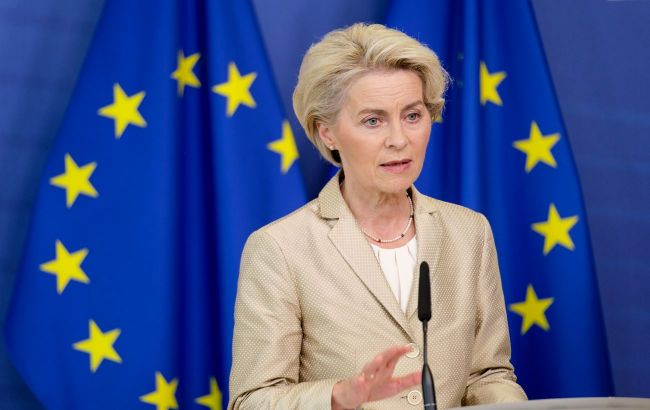Ban on LNG imports and more: EU unveils 19th package of sanctions against Russia
 Photo: European Commission President Ursula von der Leyen (Getty Images)
Photo: European Commission President Ursula von der Leyen (Getty Images)
The European Commission has presented its 19th package of anti-Russian sanctions. In particular, European countries may completely abandon Russian liquefied natural gas, according to a statement by European Commission President Ursula von der Leyen.
Von der Leyen emphasized that over the past month, Russia has fully demonstrated its contempt for diplomacy and international law. This is evidenced by massive strikes on Ukraine, as well as the intrusion of Russian drones into the airspace of Poland and Romania.
"Again and again, President Putin has escalated. And in response, Europe is increasing its pressure. This is why today I am presenting our 19th package of sanctions," the European Commission president added.
Strike on energy
Von der Leyen reminded that Russia’s economy relies on revenues from energy resources. Therefore, the EU aims to reduce these revenues.
"So we are banning imports of Russian LNG into European markets. It is time to turn off the tap. We are prepared for this. We have been saving energy, diversifying supplies and investing in low-carbon sources of energy like never before. Today, these efforts pay off," she added.
The head of the European Commission recalled that under the 18th sanctions package, the EU lowered the price cap on Russian oil to $47.6 per barrel. To strengthen enforcement, the 19th sanctions package will introduce restrictions against another 118 vessels of the shadow fleet. In total, more than 560 tankers are under EU sanctions.
It is also proposed to introduce a full ban on transactions for Russia’s major energy companies Rosneft and Gazpromneft. Assets of other companies will also be frozen.
"We target refineries, oil traders, petrochemical companies in third countries, including China. In three years, Russia's oil revenues in Europe have gone down by 90%. We are now turning that page for good," the European Commission president added.
Strike on the financial sector
Ursula von der Leyen also emphasized that under the new sanctions package, the European Union will introduce a ban on transactions for new banks in Russia and third countries.
For the first time, crypto platforms will come under restrictions: cryptocurrency transactions will be prohibited. The sanctions list will also include foreign banks linked to Russian alternative payment systems.
"And we are restricting transactions with entities in special economic zones," von der Leyen clarified.
Export restrictions
The European Union plans to introduce new direct bans on the export of goods and technologies used in the war. The sanctions list will include 45 companies from Russia and other countries that directly or indirectly support the Russian defense sector.
" In a war driven by innovation, cutting off Russia's access to key technologies is crucial. Above all when it comes to drones," von der Leyen added.
Impact of sanctions
The head of the European Commission noted that the sanctions are already dealing a heavy blow to the Russian economy.
"The interest rate is at 17%. Inflation is persistently high. Russian access to financing and revenues are consistently decreasing. And Russia's overheated war economy is coming to its limits," she added.
Von der Leyen assured that the EU will continue applying sanctions against Russia until it sits down at the negotiating table with Ukraine to establish a just and lasting peace.
For reference, Bloomberg previously reported, citing sources, that the European Commission would propose a full ban on the import of Russian LNG by January 1, 2027, as part of the 19th sanctions package — a year earlier than initially planned.

